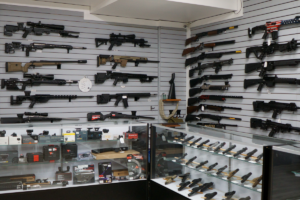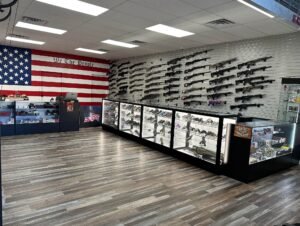If you’re considering a visit to a gun store, it’s important to be prepared and knowledgeable before stepping foot through the door. That’s where Concealed Carry 360 comes in. At Concealed Carry 360, we strive to empower, educate, and entertain individuals from all experience levels in the world of responsible firearm ownership and concealed carry. From detailed breakdowns of concealed carry laws to practical gear reviews and expert insights, we offer a comprehensive resource for anyone interested in responsible gun ownership. Whether you’re a responsible gun owner, new permit holder, self-defense enthusiast, or seeking firearms training, Concealed Carry 360 is here to provide you with the information and guidance you need to make the most informed decisions for your personal protection.
Understanding Firearms Laws
Before purchasing a firearm, it is crucial to understand the firearms laws in your state and local area. Each state and even each municipality may have different regulations regarding the sale, possession, and use of firearms. Researching and familiarizing yourself with these laws will ensure that you are able to navigate the purchasing process legally and responsibly.
Research State and Local Laws
Start by researching the specific firearms laws in your state. This information is typically available on your state’s government website or through reputable legal resources. Pay close attention to regulations regarding background checks, waiting periods, and any restrictions on specific types of firearms or ammunition.
Additionally, some cities or counties may have additional restrictions beyond state law. Check with local law enforcement agencies or visit your city or county government’s website to learn about any specific regulations in your area.
Understand Federal Regulations
In addition to state and local laws, there are also federal regulations that apply to firearms. It is important to have a basic understanding of these regulations, as they set the minimum requirements that must be followed nationwide.
Some key federal regulations include the requirement for licensed firearm dealers to conduct background checks on all potential buyers, the ban on firearms for certain groups such as convicted felons, and restrictions on the sale and possession of certain types of firearms, such as fully automatic weapons.
To ensure compliance with federal regulations, it may be helpful to review the guidelines provided by the Bureau of Alcohol, Tobacco, Firearms, and Explosives (ATF). Their website offers a wealth of information on federal firearms laws and regulations.
Know the Requirements for Purchasing a Firearm
Before visiting a gun store, familiarize yourself with the requirements for purchasing a firearm in your state. This typically includes being at least 18 or 21 years old (depending on the type of firearm), passing a background check, and fulfilling any additional documentation or waiting periods that may be required.
By understanding the purchasing requirements beforehand, you can ensure that you have all the necessary documentation and meet the legal criteria to make a purchase.
Deciding on the Type of Firearm
Once you have a good grasp of the legal aspects, it’s time to consider what type of firearm will best suit your needs. There are various factors to consider when making this decision.
Consider Your Purpose
Think about why you want to own a firearm. Are you interested in self-defense, target shooting, hunting, or a combination of these? Understanding your purpose will help guide you in selecting the most appropriate firearm.
For self-defense, a compact handgun or a shotgun may be a suitable choice. If you plan on hunting, consider rifles or shotguns specifically designed for that purpose. For recreational target shooting, you may opt for a handgun, rifle, or even a specialized competition firearm.
Evaluate Different Types of Firearms
There is a wide range of firearms available, each with its own characteristics and features. Take the time to research and evaluate different types, such as handguns, rifles, shotguns, and even specialized firearms like muzzleloaders or black powder guns.
Consider factors such as ease of use, recoil, ammunition capacity, and overall ergonomics. It can be helpful to visit a gun store and handle different firearms to get a sense of how they feel in your hands.
Learn About Different Calibers
Once you have identified the type of firearm that best suits your needs, it’s important to understand the different calibers available. Caliber refers to the diameter of the firearm’s barrel, and it determines the size of the ammunition the firearm uses.
Each caliber has its own characteristics and intended uses. Research the ballistics, availability, and cost of ammunition for different calibers to make an informed decision. Consider factors such as recoil, stopping power, and the specific uses for which the caliber is typically recommended.
By considering your purpose, evaluating different types of firearms, and learning about different calibers, you can identify the firearm that is the best fit for you.
Researching Gun Stores
When it comes time to visit a gun store, it’s important to choose a reputable and reliable establishment. By doing some research ahead of time, you can ensure that you have a positive experience and receive expert guidance throughout your firearms purchase.
Check for Licensed Gun Stores
One of the first things to consider when researching gun stores is whether they are licensed. Licensed gun stores have met specific legal requirements and are authorized to sell firearms. This ensures that you are dealing with a reputable establishment that follows all applicable laws and regulations.
You can typically check the licensing status of a gun store by visiting your state’s government website or contacting the appropriate licensing authority. Look for stores that prominently display their license or certification, as this is a good indicator of their legitimacy.
Read Reviews and Recommendations
To gain insight into the quality and reputation of a gun store, read online reviews and recommendations from other customers. Websites and platforms such as Google, Yelp, and gun enthusiast forums often feature reviews and ratings for local businesses, including gun stores.
Pay attention to feedback regarding customer service, product availability, and overall customer satisfaction. This information can help you narrow down your options and choose a store that aligns with your needs and expectations.
Consider the Store’s Inventory and Specializations
Different gun stores may have varying inventories and specializations. Consider what you are specifically looking for and check if the store carries the types of firearms, ammunition, and accessories that you are interested in.
If you have a specific interest, such as historical firearms or competition shooting, seek out stores that specialize in those areas. These stores may have a more extensive selection of products and knowledgeable staff who can provide expert advice.
By considering the licensing status, reading reviews, and evaluating the inventory and specializations of different gun stores, you can choose a reputable establishment that meets your specific needs.
Preparing for Your Visit
Before heading to the gun store, it’s important to come prepared. By taking a few important steps beforehand, you can ensure that your visit is productive and that you have all the necessary information to make an informed decision.
Bring Proper Identification
When purchasing a firearm, you will be required to provide proper identification to comply with legal requirements. Typically, this includes a valid government-issued ID such as a driver’s license or passport.
Ensure that your identification documents are up to date, valid, and matches the information you will be providing at the gun store. Bringing the necessary identification will help facilitate the purchasing process and prevent any unnecessary delays.
Consider Taking a Firearm Safety Course
If you are new to firearms or want to brush up on your knowledge and skills, considering taking a firearm safety course before visiting a gun store. These courses provide essential information on safe handling, storage, and operation of firearms.
Firearm safety courses are typically offered by certified instructors or training organizations. Check with local shooting ranges, gun clubs, or even the gun store itself for recommendations on reputable instructors or courses in your area.
Prepare a List of Questions
To make the most of your visit to the gun store, prepare a list of questions that you would like to ask the staff. These questions can relate to specific firearms you are interested in, the purchasing process, or any other concerns or curiosities you may have.
Writing down your questions ahead of time ensures that you won’t forget anything during your visit. It also shows the staff that you are serious and engaged, which may lead to more personalized and helpful assistance.
By bringing proper identification, considering a firearm safety course, and preparing a list of questions, you can make your visit to the gun store more efficient and productive.

Safety at the Gun Store
When visiting a gun store, safety should always be a top priority. By following the store’s policies and rules, handling firearms safely, and seeking assistance when needed, you can ensure a safe and responsible experience.
Follow Store Policies and Rules
Each gun store will have its own set of policies and rules in place to maintain a safe environment for customers and staff. It is important to familiarize yourself with these policies and follow them at all times during your visit.
Common store policies may include rules regarding the handling of firearms, restrictions on loaded firearms in the store, and guidelines for trying out or inspecting firearms. Take the time to read and understand these policies to avoid any misunderstandings or potential safety hazards.
Handle Firearms Safely
When handling firearms at the gun store, always prioritize safety. Treat every firearm as if it is loaded, and keep your finger off the trigger until you are ready to shoot. Point the muzzle in a safe direction at all times, away from yourself and others.
If you are unfamiliar with how to safely handle a specific firearm, don’t hesitate to ask for guidance from the store staff. They are there to help and ensure that everyone remains safe during the handling and examination of firearms.
Ask for Assistance if Needed
If you have any questions or concerns while at the gun store, don’t hesitate to seek assistance from the knowledgeable staff. They are experts in firearms and can provide valuable guidance on everything from selecting the right firearm to safely operating it.
Whether you need help with proper grip and stance, have questions about specific features of a firearm, or need assistance with disassembling or cleaning a firearm, the staff at the gun store is there to assist you. Remember, there is no such thing as a silly question when it comes to firearm safety.
By following store policies and rules, handling firearms safely, and asking for assistance when needed, you can ensure a safe and responsible experience at the gun store.
Understanding the Purchase Process
The purchase process for a firearm involves several steps, including completing required forms, undergoing a background check, and waiting for approval or denial. Understanding each step is essential for a smooth and successful transaction.
Complete the Required Forms
When purchasing a firearm, you will typically be required to complete certain forms, such as ATF Form 4473. This form collects information about you, the firearm you are purchasing, and your eligibility to own a firearm.
The form may ask for personal information, including your name, address, and social security number. You will also need to provide information about the firearm, such as make, model, and serial number.
Take the time to carefully read and fill out the forms, ensuring that all information is accurate and complete. Inaccurate or incomplete information can result in delays or the rejection of your purchase.
Pass a Background Check
As part of the purchasing process, you will also need to undergo a background check. This check is conducted by the gun store or the designated authority and is intended to verify that you meet the legal requirements to own a firearm.
The background check typically involves a review of your criminal history, mental health records, and other relevant information. The purpose is to identify any potential disqualifying factors, such as certain criminal convictions or mental health conditions that would prohibit the possession of a firearm.
Cooperate fully with the background check process by providing accurate and truthful information. If you have any concerns or questions regarding the background check, consult with the store staff or the designated authority overseeing the process.
Wait for Approval or Denial
After completing the required forms and undergoing the background check, you will need to wait for approval or denial of your purchase. The length of this waiting period can vary depending on your state and local laws, as well as other factors such as the workload of the authorities conducting the checks.
During this waiting period, it is important to be patient and refrain from attempting to acquire a firearm by other means. It is illegal to possess a firearm without proper authorization, so waiting for the proper approval is crucial.
Once you receive approval, you can proceed with the final steps of the purchase process. If your purchase is denied, seek clarification on the reasons for the denial and explore any available options for addressing the issue.
By understanding and following the purchase process, you can navigate the legal requirements and ensure a successful acquisition of a firearm.

Exploring Accessories and Ammunition
When it comes to firearms, accessories and ammunition play a crucial role in their functionality and effectiveness. Taking the time to learn about different accessories and ammunition types will enhance your overall firearms experience.
Learn about Gun Accessories
Gun accessories can enhance the performance, comfort, and customization of your firearm. These accessories can include items such as optics, grips, slings, magazines, and more.
Research different accessories that are compatible with your firearm and consider your personal needs and preferences. For example, if you plan on using your firearm for home defense, a weapon light or laser may be beneficial. If you plan on carrying your firearm concealed, a holster and spare magazine holder may be necessary.
It is important to note that some accessories may be subject to additional regulations or restrictions. For example, certain accessories, such as suppressors or high-capacity magazines, may be regulated at the federal or state level. Research the laws and regulations surrounding accessories in your area to ensure compliance.
Understand Different Ammunition Types
The type of ammunition you choose for your firearm can greatly impact its performance and suitability for different purposes. Ammunition is typically categorized by its caliber, bullet type, and intended use.
Research and understand the different ammunition types available for your firearm. Consider factors such as bullet weight, velocity, and terminal ballistics. For self-defense purposes, hollow point ammunition is often recommended due to its superior stopping power and decreased risk of over-penetration.
It is important to select ammunition that is appropriate for your firearm and intended use. Consult with the gun store staff or experienced professionals to ensure you are making an informed decision.
Consider Extra Costs
When exploring accessories and ammunition, it is important to consider any additional costs that may be associated with them. Quality accessories and ammunition can be significant investments, so budget accordingly.
In addition to the upfront costs of accessories and ammunition, also consider ongoing expenses. Ammunition, in particular, can become a significant cost if you plan on practicing and training regularly. Factor in the cost of range fees, targets, and other accessories that may be necessary for your training and practice sessions.
By learning about different accessories and ammunition types and considering the associated costs, you can make informed decisions and enhance your overall firearms experience.
Knowing Your Rights and Responsibilities
As a responsible gun owner, it is important to understand your rights and responsibilities when it comes to firearms. Being knowledgeable about self-defense laws, concealed carry laws, and safe storage and transportation practices will ensure that you are acting within the bounds of the law and promoting a safe environment.
Learn about Self-Defense Laws
Self-defense laws can vary by jurisdiction, so it is important to familiarize yourself with the specific laws in your state or local area. In general, self-defense laws allow individuals to use reasonable force, including deadly force if necessary, to protect themselves or others from imminent harm.
Research your state’s self-defense laws, including any special provisions or requirements. Pay attention to factors such as the duty to retreat, castle doctrine laws, and the use of deadly force in different situations. Familiarize yourself with scenarios that may constitute justifiable self-defense and those that may be considered excessive force.
Understanding self-defense laws will help ensure that you act within the boundaries of the law while protecting yourself and others.
Understand Concealed Carry Laws
If you plan on carrying a concealed firearm, it is crucial to understand the concealed carry laws in your state. These laws dictate who can carry a concealed firearm, where it is allowed, and any applicable licensing or permitting requirements.
Research your state’s concealed carry laws and familiarize yourself with the eligibility criteria, application process, and any training or education requirements. Some states may have reciprocity agreements with other states, allowing individuals with out-of-state permits to carry concealed firearms. Understanding these laws will help you navigate the process of obtaining and maintaining a concealed carry permit.
Keep in mind that concealed carry laws can be subject to change, so staying up to date with any legislative or regulatory updates is essential.
Know How to Store and Transport Firearms Safely
Properly storing and transporting firearms is a fundamental aspect of responsible gun ownership. It helps prevent unauthorized access and accidents, ensuring the safety of yourself, your loved ones, and your community.
Research and understand the safe storage and transport practices outlined by your state’s laws. These practices typically include the use of gun safes or lockboxes, keeping firearms unloaded and separate from ammunition, and securing firearms in locked compartments when transporting them in a vehicle.
Make sure to follow these practices diligently to prevent theft, unauthorized access, and accidents. Education and adherence to safe storage and transport practices are crucial in promoting responsible gun ownership.
By knowing your rights and responsibilities, understanding self-defense laws and concealed carry regulations, and practicing safe storage and transport, you can be a responsible and law-abiding gun owner.

Getting Educated on Gun Safety
Owning a firearm comes with the responsibility of ensuring safe handling, operation, and storage. Educating yourself on gun safety is essential to prevent accidents, promote responsible ownership, and protect yourself and others.
Take a Firearm Safety Course
Regardless of your experience level, it is always beneficial to take a firearm safety course. These courses provide comprehensive education on safe handling, storage, and operation of firearms.
Look for certified instructors or training organizations that offer firearm safety courses in your area. These courses cover topics such as firearm nomenclature, safe handling procedures, shooting fundamentals, and basic maintenance. They may also include practical exercises and range time to reinforce the concepts taught.
Participating in a firearm safety course will give you the skills and knowledge necessary to handle firearms safely and confidently.
Practice Proper Firearm Handling
In addition to formal education, regular practice of proper firearm handling is essential to maintain proficiency and safety. Familiarize yourself with the safe handling procedures outlined in your firearm safety course and consistently apply them whenever you handle a firearm.
Practice proper grip, stance, and trigger control. Ensure that you are familiar with the operation and controls of your specific firearm. Regular practice at the shooting range or in controlled environments will help build muscle memory and reinforce safe handling habits.
Remember, safe handling is not limited to the range. Always handle firearms with care, even when not actively shooting. Treat every firearm as if it is loaded and follow the proper safety protocols regardless of the situation.
Educate Yourself on Storage and Maintenance
Proper storage and maintenance of firearms are crucial for their longevity and safe operation. Educate yourself on the best practices for storing and maintaining your firearms.
Invest in a suitable gun safe or lockbox to secure your firearms when they are not in use. Follow the manufacturer’s recommendations for cleaning and maintenance, as well as any laws or regulations regarding storage in your area. Regularly inspect your firearms for signs of wear or damage, and address any issues promptly.
Proper education on storage and maintenance practices will keep your firearms in excellent condition and reduce the risk of accidents or malfunctions.
By taking a firearm safety course, practicing proper handling, and educating yourself on storage and maintenance, you can become a responsible and proficient firearm owner.
Choosing a Firearm that Fits You
Choosing a firearm that fits you well is essential for comfort, accuracy, and overall enjoyment. By trying out different types of firearms, considering size, weight, and comfort, and seeking professional assistance if needed, you can find the firearm that is the best match for you.
Try Different Types of Firearms
To determine which firearm suits you best, consider trying out different types of firearms. Ideally, you should visit a shooting range that offers rentals or borrow firearms from friends or family who are experienced shooters.
Experiment with different types, such as handguns, rifles, and shotguns. Pay attention to factors such as ergonomics, recoil, and ease of use. Find a firearm that feels comfortable in your hands and suits your shooting style.
Consider Size, Weight, and Comfort
Size, weight, and comfort are essential factors to consider when choosing a firearm. The firearm should be comfortable to hold, aim, and shoot, ensuring a positive shooting experience.
Consider factors such as grip size, trigger reach, and overall balance. What may be comfortable for one person may not be for another, so it’s important to find a firearm that fits your unique physical attributes and preferences.
Remember to also consider the practical aspects of size and weight. If you plan on carrying a concealed firearm, a compact or subcompact handgun may be more suitable. If you are primarily using the firearm for home defense or range shooting, a larger firearm may be more comfortable and easier to handle.
Seek Professional Assistance if Needed
Choosing the right firearm can sometimes be overwhelming, especially for beginners or those with limited experience. If you are unsure or struggling to find the right fit, don’t hesitate to seek professional assistance.
Visit a reputable gun store and consult with the knowledgeable staff. They can provide valuable guidance based on their expertise and experience. Explain your needs, preferences, and any concerns you may have. They may be able to recommend specific models or brands that align with your requirements.
Consider attending gun shows or other firearm-related events, as they often provide opportunities to handle a wide variety of firearms and seek advice from professionals.
By trying different types of firearms, considering size, weight, and comfort, and seeking professional assistance if needed, you can find a firearm that fits you perfectly and enhances your shooting experience.
Choosing the right firearm involves research, understanding, and consideration of various factors. By following these guidelines, you can confidently navigate the process of purchasing, handling, and owning a firearm while promoting safety and responsibility. Remember, responsible gun ownership is a commitment that requires continuous learning, practice, and adherence to applicable laws and regulations. With the right knowledge and mindset, you can enjoy the benefits of firearms ownership while ensuring the safety of yourself and those around you.


